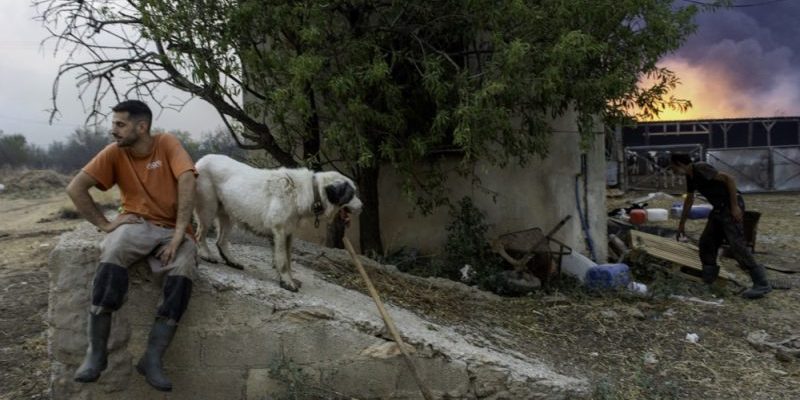Authorities ordered the evacuation of a handful of communities in central Greece on Wednesday (26 July) as they battled new fire fronts in the country, supercharged by strong winds and heatwave temperatures exceeding 40 Celsius.
Sixty-one wildfires erupted across Greece in the last 24 hours alone, the fire brigade said, with the worst outbreaks near the central town of Velestino where officials ordered precautionary evacuations of six nearby communities.
Dozens of firefighters were battling the flames, assisted by 15 fire engines and four aircraft.
A separate wildfire flared near another central town, Lamia, where residents of several settlements were also told to leave their homes.
Fires had largely died down on the Greek island of Rhodes, where more than 20,000 foreign visitors and locals fled seaside hotels and homes over the weekend. Firefighters were still trying to put out a wall of flames close to a mountainous area in Rhodes’ south, that has burned uncontrolled for more than a week.
“The battle with the devastating fires continues on several fronts today by all Civil Protection forces in extreme conditions,” fire brigade spokesperson Ioannis Artopios said in a briefing. “Today is the most difficult day of this summer.”
Artopios said the risk of fire remained “extreme” for several areas of Greece on Thursday.
Climate Crisis and Civil Protection Minister Vassilis Kikilias said Greece was experiencing “very dangerous summer days.” The fires, he said, were fanned by strong winds and worsened by abnormally high temperatures, kindling fronts stretching for several kilometers (miles).
“Given the climate crisis, we will again have extreme weather conditions that will again test our strength. Nothing is over, the battle will continue throughout the summer,” he said.
Containing damage to tourism
The government on Wednesday sought to contain damage to the reputation of one of its crucial revenue earners, tourism.
Greece is heavily reliant on its sea and sun tourist trade and Rhodes, one of its largest Aegean islands, is among its top destinations, attracting about 1.5 million foreign visitors in the summer months.
Around 3,000 holidaymakers had left Rhodes to return home by plane by Tuesday, while tour operators cancelled upcoming trips. TUI dropped flights to Rhodes through Friday.
Tourism Minister Olga Kefalogianni stressed that wildfires had affected only a small part of the island.
“We have contacted the chamber of hoteliers and we want to see how we can bring people with holiday vouchers back,” she told Open television.
Firefighters were also tackling a blaze on the island of Evia, where two pilots were killed on Tuesday when their Canadair CL-215 plane crashed into a hillside as it was dropping water onto the flames.
The burnt body of a 41-year-old stockbreeder, missing since Sunday, was found in a shack in a remote area of the island.
Wildfires in Greece are common in the summer, but hotter, drier and windier conditions, the result of a climate change, have turned the country into a Mediterranean hotspot in recent years.
On Wednesday, the government shut the ancient Acropolis in Athens, one of the world’s most visited tourism sites, at 11 a.m. (0800 GMT) because of the searing heat.
“I am making a plea that no worker is out on the streets today. It will be the hottest day of the summer,” Labour Minister Adonis Georgiadis posted on messaging platform X, formerly known as Twitter.
Artopios, the fire brigade spokesperson, said that tackling the fires was a significant financial burden for Greece, with firefighting efforts on Rhodes alone costing about €7.5 million so far.
Greek wildfires released a record 1 megaton of carbon emissions between July 1 and July 25, the European Union’s Copernicus Atmosphere Monitoring Service (CAMS) said.
That was nearly double the previous July 2007 record, with the smoke plumes fouling air quality in regions downwind.

